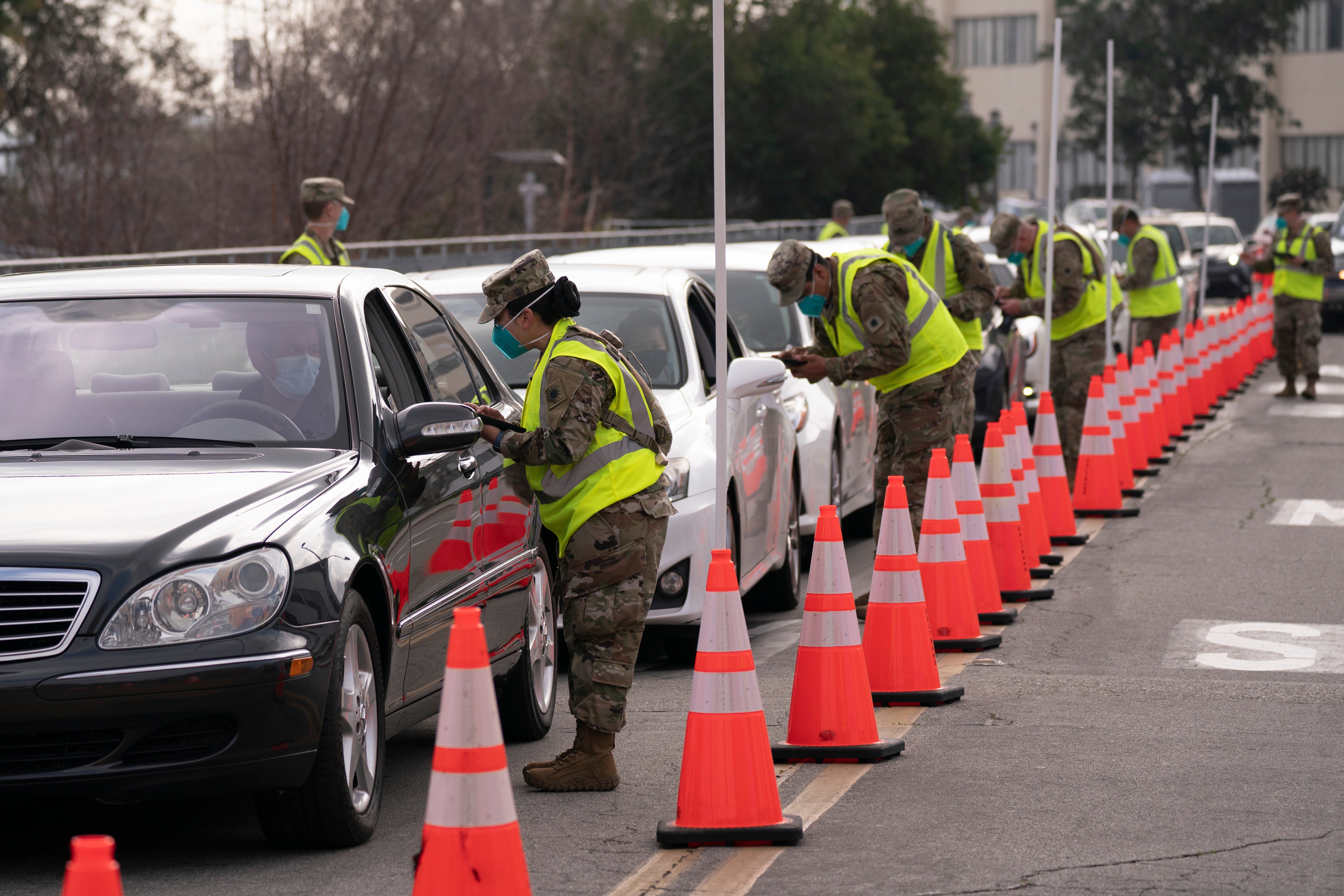FEMA opens mass vaccine sites as bad weather hampers efforts
As part of a wider effort by the Biden administration, FEMA opened its first COVID-19 mass vaccination sites Tuesday, setting up in Los Angeles and Oakland

Your support helps us to tell the story
From reproductive rights to climate change to Big Tech, The Independent is on the ground when the story is developing. Whether it's investigating the financials of Elon Musk's pro-Trump PAC or producing our latest documentary, 'The A Word', which shines a light on the American women fighting for reproductive rights, we know how important it is to parse out the facts from the messaging.
At such a critical moment in US history, we need reporters on the ground. Your donation allows us to keep sending journalists to speak to both sides of the story.
The Independent is trusted by Americans across the entire political spectrum. And unlike many other quality news outlets, we choose not to lock Americans out of our reporting and analysis with paywalls. We believe quality journalism should be available to everyone, paid for by those who can afford it.
Your support makes all the difference.FEMA opened its first COVID-19 mass vaccination sites Tuesday, setting up in Los Angeles and Oakland as part of an effort by the Biden administration to get shots into arms more quickly.
Snowy and icy weather across much of the U.S. meanwhile, forced the cancellation of some vaccination events and threatened to disrupt vaccine deliveries over the next few days. Houston’s public health agency lost power and had to scramble to give out thousands of shots before they spoiled.
The developments came as the vaccination drive ramps up. The U.S. is administering an average of about 1.67 million doses per day, according to the Centers for Disease Control and Prevention. At the same time, deaths are down sharply over the past six weeks, and new cases have plummeted.
The overall U.S. death toll has hit nearly 490,000.
Nearly 38.3 million Americans, or close to 12% of the U.S. population, have received at least one dose of the vaccine, and 14 million have received both shots, the CDC said.
Deaths are running at about 2,400 per day on average, down by more than 900 from their peak in mid-January. And the average number of new cases per day has dropped to about 85,000, the lowest in 3 1/2 months. That's down from a peak of almost a quarter-million per day in early January.
In the early morning in Los Angeles, several dozen cars were already lined up with people sitting inside reading newspapers and passing the time, a half-hour before the 9 a.m. opening of the country’s first mass vaccination site run with assistance from the Federal Emergency Management Agency.
Troops in camouflage fatigues stood around the sprawling parking lot at Cal State Los Angeles, where some 40 white tents were set up. Dozens of orange cones lined the lot to guide traffic.
The site, set up in heavily Latino East L.A. as part of an effort by the Biden administration to reach communities that have suffered disproportionately from the outbreak, aims to vaccinate up to 6,000 people a day. Another such site opened in Oakland.
Hard-hit California has overtaken New York state for the highest death toll in the nation, at over 47,000.
The Biden administration intends to establish 100 such federally assisted vaccination sites nationwide.
Elsewhere around the country, the coronavirus put a big damper on Mardi Gras in New Orleans. The French Quarter’s Bourbon Street, where the rowdiest and bawdiest partying usually takes place, was blocked off with police barricades, and bars were ordered closed.
“It’s hard to wrap my head around it,” New Orleans lawyer Dave Lanser, wearing a luminescent green cape and a black mask with a curved beak, said as he looked up and down a nearly empty Bourbon Street.
“I don’t think there’s a way to safely do it this year,” he said. “So, I support canceling the parades, closing the bars, all that kind of stuff. It’s just kind of the reality of it.”
Mardi Gras crowds last year were blamed for a severe outbreak of COVID-19 in Louisiana.
Snow, ice and bitter cold forced the cancellation of vaccinations in places such as Memphis, Tennessee, and Missouri.
Houston's Harris County rushed to dispense more than 8,000 doses of Moderna’s coronavirus vaccine after a public health facility lost power early Monday and its backup generator also failed, authorities said. The shots were distributed at three hospitals, Rice University and the county jail.
“It feels amazing. I’m very grateful,” said Harry Golen, a 19-year-old sophomore who waited for nearly four hours with his friends, much of it in the frigid cold, and was among the last people to get the shots — which otherwise wouldn’t have reached students until March or April.
More than 400,000 additional vaccine doses due in Texas now won’t arrive until at least Wednesday, officials said.
The Biden administration said the severe weather is expected to disrupt shipments from a FedEx facility in Memphis and a UPS installation in Louisville, Kentucky. Both serve as vaccine shipping hubs for a number of states.
The administration is increasing the amount of vaccine sent to states to 13.5 million doses per week, a 57% increase from when Biden took office nearly a month ago, White House press secretary Jen Psaki announced.
Psaki also said the administration is doubling to 2 million doses per week the amount of vaccine being sent to pharmacies across the U.S. as part of a program to improve access in neighborhoods.